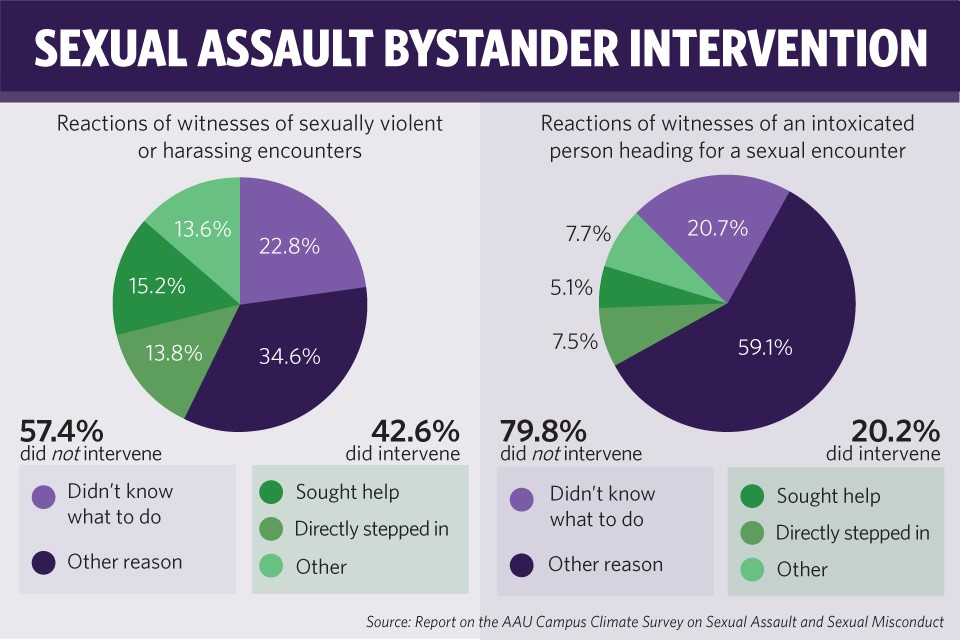Bystander Intervention
Bystander Intervention is a social science model that predicts the likelihood of individuals (or groups) willing to actively address a situation they deem problematic. A bystander is anyone who observes a situation. We all observe numerous incidents and interactions daily, but usually do not acknowledge the situation as needing our response. An active bystander is someone who acknowledges a problematic situation and chooses how to respond (Harvard University’s Office of Sexual Assault Prevention and Response 2019).
Bystander Intervention Strategies
It is important to determine as a bystander whether there is a safe and reasonable way to intervene, and to act in a way to assist a person whether it is before, during, or after an incident takes place.
First things first – be safe. Take action only if you feel that it is safe to do so. Determine what actions you feel comfortable taking based on the situation. Choose the best method to intervene based on the circumstances, including your own personal safety:
- Direct: Intervene directly. By intervening in the moment, bystanders may give the concerned person a chance to get to a safe place or leave a situation (View a video example here(opens in new window))
- Distract: Distract either party
- Delegate: Bring in someone else to help
- Delay: Check in later. Bystanders can reach out to those affected to link them with resources or offer emotional support. (View a video example incorporating Distract, Delegate, and Delay strategies here(opens in new window))

Suggestions for Safe and Positive Bystander Actions
Do’s
- Take steps to stop a friend who chooses to use violence.
- Take the initiative to help friends who aren’t thinking clearly avoid becoming targets of violence
- Prevent an intoxicated person from going to a private location with a friend or acquaintance.
- Recognize if a friend is in a relationship that involves fear or physical pain and voice your concerns where appropriate and assist them in getting help.
- Avoid situations where intoxicated people may be unable to consent.
- Talk to your friends about safety precautions and what to do if one is at risk.
- Contact the Vice President of Human Resources, the Deans, Security, or another person of authority who can assist. Please see below for contact information.
Don’ts
- Don’t leave a friend or acquaintance alone at a party or bar.
- Don’t escalate the situation.
- Don’t remain silent or stand by if there is something you can safely do to intervene.
- Don’t assume someone else has taken action to intervene.
There is no legal obligation for a bystander to intervene; however, if you observe an incident of concern and do not feel comfortable taking action, please consider contacting one of the persons listed below.
Contacts
Bystanders are encouraged to contact the Vice President of Human Resources and Title IX coordinator (Virginia Huffman: 212-327-7261), the Director of Security (James Rogers: 212-327-7339) or a designated Responsible Employee listed in Rockefeller’s Title IX & 129-B policy(opens in new window).
For mental or physical health-related issues, the Occupational Health Services Office can be reached at 212-327-8414.
If someone is in immediate danger, please immediately notify Security at 212-327-7111 or call 911 from off campus.
